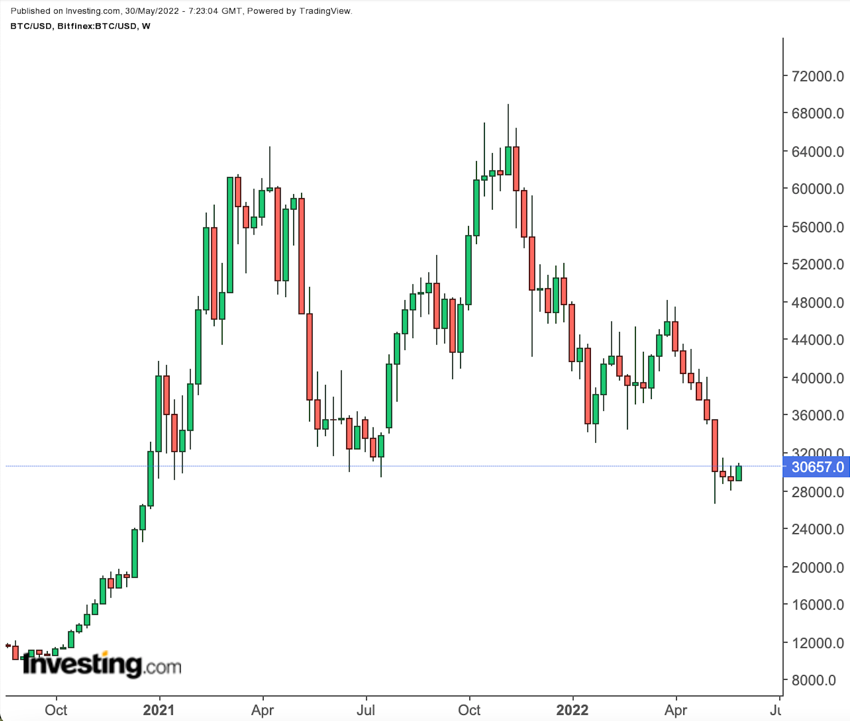This article was written exclusively for Investing.com
- El Salvador made Bitcoin its national currency
- Bitcoin plunged since the announcement, and El Salvador bought more
- Other countries are going digital, but not crypto
- Digital currencies and blockchain is the evolution of fintech
- Cryptos will take a backseat to government-issued digital currencies for 3 reasons
In 2019, 2020, and 2021, cryptocurrencies experienced rallies that propelled them into a burgeoning mainstream asset class. While most market participants and governments have embraced blockchain technology since it improves transaction speed, efficiency and record keeping, it's been another story for cryptocurrencies.
Meanwhile, the rise of cryptocurrencies, led by Bitcoin, has caused a speculative frenzy over the past years. The surge from five cents in 2010 to nearly $69,000 per token in November 2021 turned a $100 investment into a $138 million fortune for anyone who held the Bitcoin tokens. Even after the recent price carnage, the $100 spent on Bitcoin in 2010 was worth a cool $58 million. The ascent has caused over 19,600 other cryptos to come to market, and the number of new entrants increases each day.
Last year, El Salvador, a poor Central American country with a population of around 6.5 million, decided to abandon the US dollar and turn Bitcoin into its national currency. The move is not looking so smart, with Bitcoin trading a lot lower in 2022 than in 2021.
El Salvador made Bitcoin its national currency
In September 2021, Bitcoin traded in a range from $39,716.33 to $52,902.94. El Salvador purchased 400 Bitcoin for $20.9 million one day before it formally adopted the cryptocurrency as the country’s legal tender. In June 2021, El Salvador became the first nation to adopt Bitcoin as the leading means of exchange. President Nayib Bukele led a supermajority of 62 of 84 votes in the Salvadoran Congress to adopt the leading cryptocurrency as legal tender.
Bitcoin plunged since the announcement, and El Salvador bought more.
In May 2022, Bitcoin’s price has ranged from $25,919.52 to $38,555.55 per token. El Salvador added another 500 tokens to its balance sheet at the $31,000 level spending $15.5 million. The country’s total reserves now stand at 2,301 Bitcoin. At the $28,990 level on May 28, El Salvador’s volatile net worth was $66,705,990.
President Nayib Bukele has made a substantial wager on the cryptocurrency market’s future. Technology innovators and leaders agree that Bitcoin and some of the other over 19,625 tokens will appreciate. However, traditional investors like Warren Buffett and Charlie Munger disagree as they forecast the potential for Bitcoin to fall to zero. Mr. Buffett cites the lack of productive utility, while Mr. Munger calls Bitcoin “evil” and “stupid.”
Meanwhile, Bitcoin's value and El Salvador’s net worth have declined since the country embraced the top crypto.
Other countries are going digital, but not crypto
In April 2022, the Central African Republic became the second country to adopt Bitcoin as the official currency. CoinMarketCap runs a poll on which country will be the next to follow El Salvador and the Central African Republic. At the end of last week, the top candidates were:

Source: CoinMarketCap.com
While others may turn to Bitcoin, Ethereum, or other cryptos, the most likely path for countries is a digital route for their existing currencies. China is rolling out the digital yuan, the e-CNY, and is likely to be the first major economy to launch an official central bank digital currency.
Europe and the US will likely follow with digital euros and dollars. In March 2022, US President Joseph Biden signed an executive order to “Explore a US Central Bank Digital Currency (CBDC).”
Countries worldwide will seek to hold onto their control of the money supply while embracing blockchain technology. Digital dollars, euros, yuan, yen, pounds, and other fiat currencies are likely to be as far as governments are willing to go with fintech. Following El Salvador and the Central African Republic does not appear to be on the horizon for the world’s leading economies.
Digital currencies and blockchain is the evolution of fintech
Blockchain technology is fintech’s centerpiece. It is a bit of a chicken-and-egg dilemma if cryptos or blockchain were first, but the cryptocurrencies are blockchain’s answer to means of exchange. Governments have been slow to roll out their digital currencies, as anything involving technology grinds to a snail’s pace when legislators and elected officials get involved.
China, the world’s second-leading economy, has taken a leadership role with the e-CNY. The US and Europe will follow, but the process could take years, if not decades.
Cryptos will take a backseat to government-issued digital currencies for 3 reasons
3 factors should make government-issued and sponsored digital currencies cause cryptos to take a back seat over the coming years:
- Controlling the money supply is a root of government power. Contracting or expanding the supply of legal tender is a tool that governments will not surrender without an epic battle.
- The custody and security issues surrounding cryptocurrencies continue to be significant factors that impede more widespread acceptance. Hacking, ransomware, and other nefarious factors present a clear and present danger to the primarily unregulated cryptocurrency markets. Government-issued and controlled digital currencies should address and prevent these issues.
- Global regulators have not fully embraced an active borrowing and lending market for physical cryptos. Establishing interest rates is critical for developing the forward markets, and interest rate curves are necessary as the next step for the evolution of cryptocurrencies. Government-issued digital currencies will offer those interest rate curves that facilitate their acceptance as mainstream and preferred means of exchange.
Cryptocurrencies reflect a libertarian ideology, taking the control of the money supply from governments and returning it to individuals. Crypto values are a function of bids and offers in the marketplace without any government interference. While El Salvador and the Central African Republic have adopted Bitcoin as their national currencies, the only influence they can exert is by buying or selling the crypto along with the rest of the market.
Meanwhile, the speculative frenzy that drove Bitcoin and the other more than 19,600 cryptos to highs in 2021 and the asset class’s market cap to over the $3 trillion level has cooled as the prices declined. Expect lots of volatility in the asset class over the coming months and years as the battle between digital and cryptos continues.
Because of its fintech utility Blockchain will continue to thrive. As well, Bitcoin and the leading cryptos are likely to survive, but their role will depend on the government’s success with their digital currency offerings.
When investing in cryptos, expect lots of price variance and only spend the capital you are willing to lose. The potential for oversized rewards comes with lots of risk in any market, and volatile cryptocurrencies are no exception.
